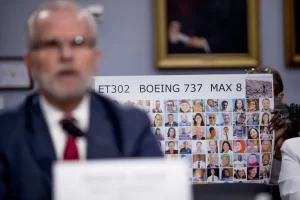The Federal Aviation Administration — a crucial part of ensuring passenger safety in our country — has been without a permanent leader for more than a year.
Meanwhile, there have been repeated near collisions between airliners, and aviation disasters have only been narrowly averted. These close calls and the still recent Boeing MAX disasters demonstrate the need for a recommitment to aviation safety. With President Joe Biden’s FAA administrator candidate recently withdrawing his nomination, the Biden administration and the U.S. Senate have a new opportunity to ensure the next candidate is both experienced and truly independent.
The FAA’s core mission is to ensure the safety of civil aviation and it aims to “provide the safest, most efficient aerospace system in the world.” In recent years, however, the FAA has not always put safety first. Instead, previous FAA administrators have allowed the aviation industry to self-regulate on important safety matters. As a result, the FAA now looks at aviation manufacturers and airlines as its “customers” and has delegated more and more of its responsibilities to the industry it is designed to oversee.
FAA leaders have come from the aviation industry and aviation lobbying groups so often there is now a de facto revolving door between the two. Former FAA administrators with deep industry ties have used their roles as regulators to push industry interests. The FAA has sided with aviation defendants in civil cases maintaining that courts must not hold the defendants liable for failing to comply with state products liability laws, but rather that aviation manufacturers need only comply with federal minimum standards. Instead of promoting the highest level of safety, the FAA could potentially reduce safety and cause aviation victims to lose their rights to seek remedies after the crash of defective aircrafts.
The Boeing 737-8 MAX disasters are the best examples of this problem. The FAA issued the certification of the MAX without understanding the airplane, and an obvious design defect soon took down two airplanes, killing 346 people. These deadly crashes were avoidable, but the FAA relied too heavily on Boeing and did not act as an independent check on the safety of the MAX. The FAA claims it does not over-delegate certification responsibilities to aviation manufacturers, but it did not know about the defects in the MAX and should never have issued an airworthiness certificate.
Daniel Elwell, the acting FAA administrator when the two MAX accidents occurred served as vice president of the Aerospace Industries Association, which is the trade association representing manufacturers and suppliers of the aviation manufacturing industry. In that capacity, Elwell served under Dennis Muilenburg, the Boeing Chief Executive Officer who also served as AIA Chairman. Under Elwell’s leadership, the FAA failed to ground the MAX after learning about the MAX’s safety problems when Lion Air Flight 610 crashed in October 2018. Instead, the FAA gave Boeing time to fix the MAX’s safety problems. Just over four months later, Ethiopian Airlines Flight 302 also crashed. Strong and independent leadership at the FAA could have prevented both crashes.
Today, the FAA has been without a permanent leader for more than a year. President Biden’s nomination of Phil Washington was met with blistering attacks. Much of the criticism was focused on his admittedly minimal experience in aviation, which was limited to his two years running Denver International Airport.
Aviation safety advocates, however, including families of the Boeing MAX disasters, supported Washington’s nomination because they saw him as a strong leader who would not have divided loyalties as administrator. Unlike prior administrators, he did not spend his formative years working for the industry.
Now that Washington has withdrawn his candidacy, President Biden has a new opportunity to correct the trend of industry proponents taking on one of our country’s most important safety roles. He will likely nominate someone with ties to the aviation industry who, unlike Washington, may sail through the nominating process. While it is likely impossible to find someone with sufficient aviation experience to lead the FAA who does not have industry ties, what the Biden administration must consider is that the most important quality of a nominee is his or her commitment to transformative safety improvements and independence.
We must learn the hard lessons from the two Boeing MAX crashes and eliminate the deficiencies that led to a defective plane killing 346 people. The new administrator of the FAA must be someone who will put aviation safety over industry interests.
The next administrator will have a great opportunity to improve safety and must commit to reforming the certification processes for airplanes and to put into place policies that will prevent the industry from exercising undue influence over the FAA. Any nominee who cannot commit to meaningful change at the FAA should be rejected.
